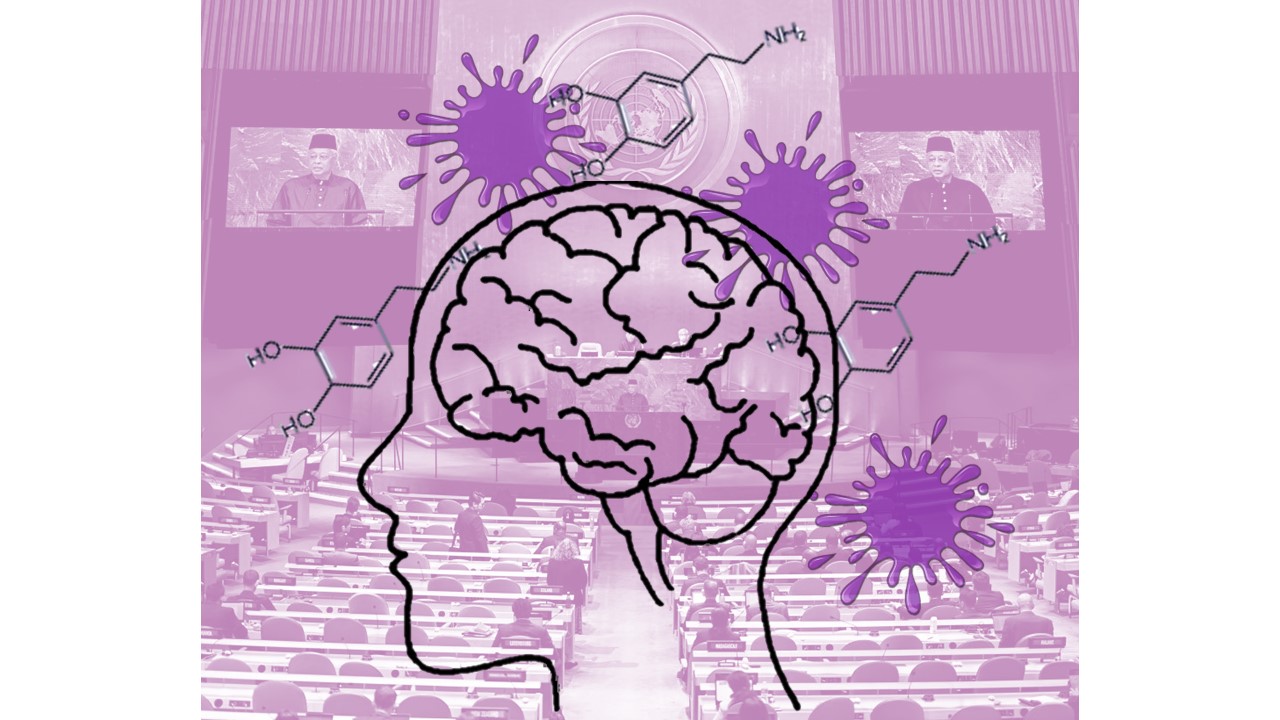Strategizing from 7 cities across the globe
UNGA Brain Days Summary
Brain health refers to both neurological and mental wellbeing, encompassing the prevention and treatment of conditions ranging from dementia and Alzheimer’s to depression. In recent years, combined neurology and psychiatry training programs have developed in response to the need for a more integrated understanding of the nervous system, with experts in the field urging the development of a new brain medicine specialty to better reflect our current state of knowledge
SUSTAINABILITYUNITED NATIONSPSYCHIATRY
Michael Martino
11/4/20246 min read


In September 2024, I was invited to, and fortunate to attend, 3 days of high-level meetings at the Science Summit of the 79th United Nations General Assembly (UNGA79) on Brain Health, Brain Capital & Building the Brain Economy. Topics discussed included national brain health plans, how the built environment affects brain health, developing new economic frameworks that will be necessary to fund such ambitious initiatives, and establishing partnerships between public, private, and philanthropic organizations. Overall, I was impressed by the range of disciplines represented and the collective commitment to a better future by addressing growing neurological and mental health diagnoses through a holistic approach that tackles both social and biological determinants of health.
What is brain health?
Brain health refers to both neurological and mental wellbeing, encompassing the prevention and treatment of conditions ranging from dementia and Alzheimer’s to depression. In recent years, combined neurology and psychiatry training programs have developed in response to the need for a more integrated understanding of the nervous system, with experts in the field urging the development of a new brain medicine specialty to better reflect our current state of knowledge. This shift reflects the broader recognition that optimal brain health underpins our emotional, cognitive, and behavioral wellbeing, and has been endorsed by national and international organizations including the World Health Organization. While individual definitions of “optimal” brain health may vary, the pillars that universally support it include:
Physical Health and Lifestyle: Regular exercise, balanced nutrition, and adequate sleep form the foundation for maintaining and enhancing brain function. These lifestyle factors play a crucial role in supporting brain plasticity, resilience, and overall cognitive performance.
Mental and Emotional Wellbeing: Practices that reduce stress, foster positive relationships, and promote emotional regulation contribute significantly to brain health. Emotional and social stability has a profound effect on preventing mental health conditions and improving quality of life.
Cognitive Engagement: Lifelong learning, challenging mental activities, and creative pursuits stimulate neurogenesis and cognitive flexibility. Engaging in diverse cognitive tasks helps maintain and even improve memory, attention, and problem-solving skills throughout life.
Social Connections: Strong social networks and meaningful interpersonal relationships enhance emotional resilience and provide mental stimulation. Social engagement is associated with better cognitive health, particularly as we age.
Purpose and Meaning: A sense of purpose, personal fulfillment, and engagement in activities that provide meaning contribute to both mental health and cognitive wellbeing, reducing the risk of mental health challenges and supporting overall resilience.
Access to Medical Care: Though lifestyle efforts can support optimal brain health, access to adequate medical care for proper management of brain health is essential for population brain health. Though this may seem obvious in developed nations, the availability of neurologists or mental health providers is severely limited.
These pillars form a comprehensive approach to sustaining brain health across the lifespan, underscoring the need for both personal and societal commitment to fostering a brain-healthy world. The importance of societal commitment can not be overstated - the growing field of behavioral economics, which attempts to better understand the factors that influence our decisions to diverge from what seems most rational under ideal conditions by accounting for individual circumstances (ie: life experiences, demographic factors, culture, etc.), has demonstrated how context profoundly shapes and constrains human behavior. These findings conflict with Western culture’s historic emphasis on personal responsibility which only serves to exacerbate existing inequities.
National brain health plans
Though the above mentioned pillars are broad and potentially overwhelming, nations throughout the world are committed to achieving the vision of brain health for all. In nations where industrialization is allowing rapid development such as India, national efforts are focused on prevention of chronic diseases associated with the myriad changes to social structure that result (ie: lifestyle diseases), with a major emphasis on preventing dementia. Scandinavian countries, on the other hand, are interested in bringing public awareness to brain healthy habits while designing evidence based policies and interventions that address the complex factors influencing human behavior. For example, Professor Jo-An Occhipinti of the University of Sydney is conducting important work regarding social productivity metrics and compensation, with compensation including traditional payments or time banks, a community based system where people exchange time and skills for each other’s services instead of money. Though much work remains to be done, the global commitment to the wellbeing of the global populace was truly inspiring.
Wellness in the workplace
Over the last few decades, the private sector has made great strides in fostering a workplace that values the whole individual, including their brain health. Admittedly, current efforts to address wellness in a majority of venues leaves much to be desired, emphasizing personal responsibility for making time to engage in pro-brain healthy behaviors without providing the necessary support to do so. The businesses in attendance were the exception, with many dedicating significant resources to helping employees navigate life’s stressors, ranging from navigating the buying and selling of property to managing the difficulties of caring for a loved one with chronic health conditions. This support promotes sustained high performance, providing a mutually beneficial situation in which employees feel supported to live their lives and do their best work, in turn increasing the quality of their work, and increasing retention. Those interested in reading more about these comprehensive approaches to wellbeing in the workplace are encouraged to visit the Hero scorecard developed by McKinsey Health to quantify metrics of wellbeing in the workplace.
The built environment
One obvious place to start for workplaces is environmental design. It is generally well accepted that the built environment has a profound effect on brain health, with noise pollution and lack of access to green space cited as major risk factors for poor health. Design firms like Perkins + Will have demonstrated how building environments that take these considerations into account can profoundly influence overall wellbeing. Their work on medical centers in the state of Texas prioritized the mental wellbeing of patients and providers, resulting in improved patient outcomes and a more compassionate environment for providers. Other firms like HKS are engaged in similarly impactful work, supporting an active research team to develop new strategies for accomplishing their mission of building to support high performance workplaces and sustainable communities. These and other like minded firms will be key to achieving the vision of brain health for all - building communities with sustainability and connection in mind will be essential, and requires innovative approaches to deploy.
Rethinking economics
Creating sustainable, large-scale change in brain health will require more than clinical and environmental interventions; it demands a fundamental rethinking of economic models and funding strategies. At the UNGA Science Summit, speakers like Shiva Dustdar from the European Investment Bank Institution presented innovative approaches for supporting brain health funding that extend beyond traditional healthcare. Strategies include “brain bonds,” inspired by green bonds, and alternative frameworks to GDP, emphasizing a well-rounded measurement of national wellbeing. As an example, Wales’ “Wellbeing of Future Generations” initiative highlights the importance of public policies that value long-term wellbeing over immediate economic gain, embodying a forward-looking paradigm essential for sustainable development.
To successfully implement such economic transformations, collaborative financing structures involving public, private, and philanthropic sectors will be crucial. Programs such as IGAP and Occhipinti’s social productivity metrics are promising examples of how to leverage diverse funding to create lasting impact across demographics and industries. These strategies represent a shift from “sick care” to “preventive care”, aligning economic objectives with the wellbeing of future generations.
Conclusion
Attending the UNGA Science Summit on brain health was both enlightening and inspiring. The discussions underscored a shared global vision: a future where brain health is integrated into all facets of life, from the built environments we occupy to the policies that shape our societies. Achieving this vision will require continued innovation, sustained commitment across sectors, and bold economic strategies that prioritize prevention and resilience over treatment alone. The journey toward brain health for all is complex, yet the passion and dedication demonstrated by leaders from around the world indicate we are on the right path. By uniting expertise, embracing comprehensive strategies, and reimagining funding models, we are taking vital steps toward a world where everyone has the opportunity to thrive mentally, emotionally, and cognitively.
To learn more about brain health:
Brain capital dashboard: https://www.brookings.edu/articles/the-global-brain-capital-dashboard/
Selected publications:
https://www.sciencedirect.com/science/article/pii/S0896627324002770
https://pmc.ncbi.nlm.nih.gov/articles/PMC11046160/
https://pmc.ncbi.nlm.nih.gov/articles/PMC10917588/
https://www.thelancet.com/journals/laneur/article/PIIS1474-4422(24)003648/fulltext
About the Author:
Michael Martino, MS, is a current MD/PhD student pursuing his PhD in Neuroscience at the Medical University of South Carolina (MUSC). Through his work, Michael seeks a better understanding of how the brain’s normal processes are disrupted in mental health disorders. Michael is an outspoken advocate for updating our understanding of human behavior to reflect contemporary advances in related fields, and applying these principles to prioritize the mental wellbeing of people throughout the world.
Download the full document
